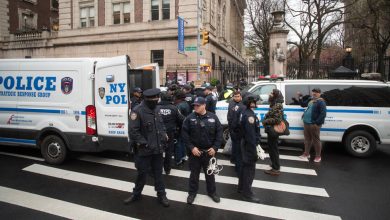Your Tuesday Briefing

We’re covering the virtual summit between Biden and Xi, India’s decision to welcome vaccinated tourists and Japan’s recent economic struggles.

Joe Biden, then the vice president, met the Chinese president Xi Jinping in Beijing in 2013.Credit…Pool photo by Lintao Zhang
Biden and Xi meet amid tensions
President Biden and the Chinese leader Xi Jinping are having their third conversation in 10 months in an effort to keep “communication lines open” and avoid military action as tensions escalate.
With human rights abuses in the Xinjiang region, Beijing’s pressure campaign in Taiwan and China’s policies regarding cybertechnologies — all of which Biden plans on bringing up, according to a senior official — American officials remain concerned that the chances of avoiding conflict may be diminishing.
The three-hour virtual summit later today will be a test of the Biden administration’s effort to engage in “intense competition” with China without entering into serious military conflict.
What’s next: One area of potential agreement may be climate. Although Xi did not attend the U.N. climate conference this month, and China remains the world’s biggest polluter, the two countries did announce a joint agreement to “enhance ambition” on climate change.
Background: Barack Obama tried a similar balancing act with the Chinese, securing promises from Xi to avoid militarizing the South China Sea and to reduce cyberconflicts. But since then, China has built up its military presence in the South China Sea, and cyberclashes have intensified.
Related: Wall Street banks are finally being allowed to expand their businesses in China. But the access may not last for long.
India invites vaccinated travelers
The Indian government announced that vaccinated foreigners from certain countries could travel to the country for the first time in more than 20 months.
The return of tourism will be a major boost for the country, which in 2020 drew about a quarter of the travelers it had in 2019. However, India’s new rule only allows travel from 99 countries that have reciprocated. Travelers from several major countries, including China, Britain and Canada, are not yet allowed in because their countries have not reopened to visitors from India.
The new rules are a sign of confidence in the country’s vaccination campaign. India recently administered its billionth vaccine dose, and more than 30 percent of the eligible population has been fully vaccinated. New cases are averaging about 20,000 daily, down from a May peak of more than 400,000.
India joins a host of Asian countries that are lifting travel restrictions on foreign tourists. Cambodia also announced the end of its quarantine for inbound vaccinated travelers yesterday. South Korea and Singapore began a travel arrangement this week that allows fully vaccinated visitors to travel to either country without having to quarantine.
Here are the latest updates and maps of the pandemic.
In other developments:
-
European countries are introducing increasingly targeted restrictions against the unvaccinated, who are driving a fourth wave of Covid-19 cases and deaths.
-
Why don’t we have a Covid vaccine for pets? Experts say it’s feasible but unnecessary.
-
Ngati Toa, the Maori tribe that owns the legal rights to the ceremonial dance known as the Ka Mate haka, called for anti-vaccine protesters to stop performing it.
Japan’s economy shrinks, but optimism remains
Life in Japan was disrupted by two major setbacks during the third quarter: a supply crunch that hit major manufacturers and the country’s worst coronavirus outbreak of the pandemic.
From July to September, Japan’s economy shrunk by an annualized rate of 3 percent, reflecting the nation’s struggles to free itself from the virus-induced quagmire. Japan’s slow return to prepandemic life has left it lagging behind its peers in some ways, but the issues may not last long.
Japan now has one of the highest vaccination rates among major nations, and it has lifted virtually all restrictions on its economy. Covid cases have dropped about 99 percent since their August peak. Foot traffic has nearly returned to prepandemic levels. Also, the semiconductor and the auto industries are expected to rebound relatively quickly as the pandemic begins to wane in Southeast Asia.
What’s next: The Japanese government is expected to pass a stimulus package in the coming days, providing cash handouts to families with children, giving aid to small businesses and implementing measures to offset rising fuel prices.
Restrictions: Other factors will continue to weigh on growth. The country remains closed to tourists and difficult to enter for many businesspeople and students.
THE LATEST NEWS
Asia Pacific
-
Two journalists in India were arrested after they tried to cover religiously motivated violence.
-
An American journalist, Danny Fenster, was released from prison in Myanmar and will be allowed to return to the U.S.
-
Rodrigo Duterte, the president of the Philippines who previously said he would retire, will run for Senate in next year’s elections, a reversal that came just days after his daughter filed papers to run for vice president.
-
As Japan’s population rapidly ages, waste from adult diapers is growing by tens of thousands of tons a year. One town is recycling them into an alternative fuel source.
Around the World
-
A Liverpool taxi driver was hailed as a hero after his actions minimized the impact of a possible terrorist explosion outside an English hospital.
-
In eastern Ukraine, a dispute over grocery shopping in a buffer zone between separatists and Ukrainian forces led to artillery strikes.
-
Shell, Europe’s largest energy company, proposed to move its headquarters to Britain and drop “Royal Dutch” from its name.
-
After the U.N. climate summit, the promises made now rest in the hands of a few leaders.
A Morning Read
In remote southwestern Bulgaria, the Rhodope Narrow-Gauge Railway — a 100-year-old railroad and the last of its kind in the country — is the only means of transport connecting locals to the nearby market town, which sustains their incomes. But ridership is down and maintenance costs are high, threatening the railway’s survival. See what it’s like for the daily riders who rely on the train.
ARTS AND IDEAS
Ukraine wants to be the world’s crypto capital
An international Crypto’s Got Talent contest is now underway. Poland, Lithuania, Estonia, Malta, Mexico, Thailand and Vietnam are all in the race. But tech entrepreneurs like Ukraine, and Ukrainians like crypto.
Ukrainians are among the most avid cryptocurrency users in the world, ranking fourth in an index compiled by Chainalysis, behind Vietnam, India and Pakistan. The volume of cryptocurrency transactions each day, about $150 million, exceeds the volume of interbank exchanges in government-issued currency.
Residents lack better options. Banks in Ukraine are so sclerotic that sending or receiving even small amounts of money from another country requires an obstacle course of paperwork. The country itself has suffered through too many scandals to expect a major influx from international investment banks.
The government is hoping to bury its anything-goes reputation with an assist from cryptocurrency. Step one in the ambitious campaign was legalizing and regulating Bitcoin.
But the status quo is still attractive for some. “I like that it’s corrupt here,” one crypto entrepreneur from New Jersey said. “Here, we get to play the game that only elites in the U.S. play.”
PLAY, WATCH, EAT
What to Cook
This lemony chicken soup is lighter than a traditional stew.
Wellness
These four stretches combat too much screen time.
What to Read
“The 1619 Project,” a new book based on the Times Magazine project, is “searing” and “rich in unfamiliar detail,” the historian Adam Hochschild writes in a review.
Now Time to Play
Here’s today’s Mini Crossword, and a clue: Charming and smooth (five letters).
And here is today’s Spelling Bee.
You can find all our puzzles here.
That’s it for today’s briefing. See you next time. — Matthew
P.S. Times journalists discussed what it was like covering COP26.
The latest episode of “The Daily” covers how the U.S. military hid a deadly airstrike in Syria.
You can reach Matthew and the team at [email protected].




